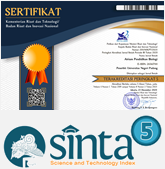PERCEPTION OF NATURAL SCIENCES’ TEACHER AND PROSPECTIVE TEACHER ON UNDERSTANDING LOW CARBON STEM LEARNING PLAN
Abstract
Keywords
Full Text:
FullpaperReferences
Amin, M. S., Permanasari, A., & Hamidah, I. (2020). Integrasi Low Carbon Education Dalam Kurikulum Pendidikan Calon Guru IPA di Indonesia sebagai Upaya Revitalisasi Peran Pendidikan IPA dalam Merespons Tantangan Ekologis di Masa Depan. Jurnal IPA & Pembelajaran IPA, 4(2), 231–243. https://doi.org/10.24815/jipi.v4i2.17965.
Amin, M. S., Permanasari, A., Setiabudi, A., & Hamidah, I. (2020). Level Literasi Low Carbon Siswa Sekolah Dasar dalam Aktivitas Kehidupan Sehari-Hari. Titian Ilmu: Jurnal Ilmiah Multi Sciences, 12(2), 49–57. https://doi.org/10.30599/jti.v12i2.653.
Antika, R. R. (2014). Proses Pembelajaran Berbasis Student Centered Learning (Studi Deskriptif di Sekolah Menengah Pertama Islam Baitul ‘Izzah, Nganjuk). BioKultur, 3(1), 251–263. http://journal.unair.ac.id/downloadfull/BK8612-1c5a7364b9fullabstract.pdf.
Cahyani, F. A. (2020). Upaya Peningkatan Daya Dukung Lingkungan Hidup Melalui Instrumen Pencegahan Kerusakan Lingkungan Hidup Berdasarkan Undang-Undang Nomor 32 Tahun 2009 Tentang Perlindungan dan Pengelolaan Lingkungan Hidup. Nurani Hukum, 2(1), 53. https://doi.org/10.51825/nhk.v2i1.5488.
Dare, E. A., Ellis, J. A., & Roehrig, G. H. (2014). Driven by Beliefs: Understanding Challenges Physical Science Teachers Face When Integrating Engineering and Physics. Journal of Pre-College Engineering Education Research (J-PEER), 4(2). https://doi.org/10.7771/2157-9288.1098.
Davidi, E. I. N., Sennen, E., & Supardi, K. (2021). Integrasi Pendekatan STEM (Science, Technology, Enggeenering and Mathematic) Untuk Peningkatan Keterampilan Berpikir Kritis Siswa Sekolah Dasar. Scholaria: Jurnal Pendidikan Dan Kebudayaan, 11(1), 11–22. https://doi.org/10.24246/j.js.2021.v11.i1.p11-22.
Diana, N., Turmudi, & Yohannes. (2021). Analysis of teachers’ difficulties in implementing STEM approach in learning: A study literature. Journal of Physics: Conference Series, 1806(1). https://doi.org/10.1088/1742-6596/1806/1/012219.
Fogarty, R. (2009). How to Integrate the Curricula. Sage Company.
Ghany, H. (2018). Penyelenggaraan Pendidikan Untuk Pembangunan Berkelanjutan Di Sekolah Dasar. Jurnal Madaniyah, 8(2), 189–202. https://journal.stitpemalang.ac.id/index.php/madaniyah/article/view/97.
Hamzah, S. (2013). Pendidikan Lingkungan; Sekelumit Wawasan Pengantar (1st ed.). Refika Aditama.
Hanifah, M., Mohmadisa, H., Yazid, S., Nasir, N., & Saiyidatina Balkhis, N. (2018). Developing Low Carbon Schools Model through Students Involvement in Sustainability Activities. International Journal of Asian Social Science, 8(8), 591–602. https://doi.org/10.18488/journal.1.2018.88.591.602.
Heryanti, A. D. (2020). Pembelajaran Berbasis Stem Untuk Meningkatkan Pemahaman Konsep Energi Dan Keterampilan Berpikir Kreatif Melalui Projek Pltmh. Jurnal Wahana Pendidikan, 7(1), 77. https://doi.org/10.25157/wa.v7i1.3241.
Hudha, M. N., Hamidah, I., Permanasari, A., & Abdullah, A. G. (2021). How low-carbon issues are addressed in primary school textbooks. Jurnal Pendidikan IPA Indonesia, 10(2), 260–269. https://doi.org/10.15294/jpii.v10i2.26628.
Hudha, Muhammad Nur, Hamidah, I., Permanasari, A., Abdullah, A. G., Rachman, I., & Matsumoto, T. (2020). Low carbon education: A review and bibliometric analysis. European Journal of Educational Research, 9(1), 319–329. https://doi.org/10.12973/eu-jer.9.1.319.
Izzati, N., Tambunan, L. R., Susanti, S., & Siregar, N. A. R. (2019). Pengenalan Pendekatan STEM sebagai Inovasi Pembelajaran Era IR 4.0. Jurnal Anugerah, 1(2), 83–89. https://doi.org/10.31629/anugerah.v1i2.1776.
Kelley, T. R., & Knowles, J. G. (2016). A conceptual framework for integrated STEM education. International Journal of STEM Education, 3(1). https://doi.org/10.1186/s40594-016-0046-z
Khairani, I., Yogica, R., Fuadiyah, S., & Lufri, L. (2020). Relation of Students’ Perceptions towards Teacher’s Learning Strategies with Biology Learning Cognitive Competencies of Grade X Students at SMAN 3 Pariaman. Jurnal Atrium Pendidikan Biologi, 5(1), 25. https://doi.org/10.24036/apb.v5i1.6732
Komisi Nasional Indonesia untuk UNESCO. (2014). Pendidikan untuk Pembangunan Berkelanjutan (Education for Sustainable Development) di Indonesia. In Kementrian Pendidikan dan Kebudayaan (Issue 9).
Meilinda, H., Prayitno, E. B., & Karyanto, P. (2017). 178429-EN-students-environmental-literacy-profile-1. Journal of Education and Learning, 11(3), 299–306.
Permanasari, A. (2016). STEM Education: Inovasi dalam Pembelajaran Sains. SEMINAR NASIONAL PENDIDIKAN SAINS “Peningkatan Kualitas Pembelajaran Sains Dan Kompetensi Guru Melalui Penelitian & Pengembangan Dalam Menghadapi Tantangan Abad-21” Surakarta, 22 Oktober 2016, 23–34.
Phang, F. A., Puspanathan, J., Musa, A. N., Baharom, M. M., Rahman, N. F., Arsat, M., & Nawi, N. D. (2019). Framework to develop low carbon society among school community. International Journal of Recent Technology and Engineering, 7(6), 773–777.
Ramli, N. F., & Talib, O. (2017). Can Education Institution Implement STEM? From Malaysian Teachers’ View. International Journal of Academic Research in Business and Social Sciences, 7(3), 2222–6990. https://doi.org/10.6007/IJARBSS/v7-i3/2772.
Rosana, M. (2018). Kebijakan Pembangunan Berkelanjutan Yang Berwawasan Lingkungan di Indonesia. KELOLA Jurnal Ilmu Sosial, 1(1), 148–163.
Sulaeman, N. F., Putra, P. D. A., Mineta, I., Hakamada, H., Takahashi, M., Ide, Y., & Kumano, Y. (2021). Exploring Student Engagement in STEM Education through the Engineering Design Process. Jurnal Penelitian Dan Pembelajaran IPA, 7(1), 1. https://doi.org/10.30870/jppi.v7i1.10455.
Susilo, H., & Sudrajat, A. K. (2020). STEM Learning and its Barrier in Schools: The Case of Biology Teachers in Malang City. Journal of Physics: Conference Series, 1563(1). https://doi.org/10.1088/1742-6596/1563/1/012042.
Sutanto, H. P. (2017). Education For Sustainable Development in West Nusa Tengara. Cakrawala Pendidikan, 3, 320–341.
Ulum, M. B., Putra, P. D. A., & Nuraini, L. (2019). Identify Use of Edp to Strengthen Student’ S Critical Thinking Ability Through Lks. ScienceEdu Vol., II (1), 50–55.
Wahono, B., & Chang, C. Y. (2019). Assessing Teacher’s Attitude, Knowledge, and Application (AKA) on STEM: An Effort to Foster the Sustainable Development of STEM Education. Sustainability (Switzerland), 11(4). https://doi.org/10.3390/su11040950.
Wahyuni, S. (2015). Pengembangan Petunjuk Praktikum Ipa Untuk Meningkatkan Kemampuan Berpikir Kritis Siswa Smp. Jurnal Pengajaran Matematika Dan Ilmu Pengetahuan Alam, 6(1), 196. https://doi.org/10.18269/jpmipa.v20i2.585.
Wang, H., Moore, T. J., Roehrig, G. H., & Park, M. S. (2011). STEM Integration: Teacher Perceptions and Practice STEM Integration: Teacher Perceptions and Practice. Journal of Pre-College Engineering Education Research (J-PEER), 1(2), 1–13. https://doi.org/10.5703/1288284314636.
Winarni, J., Zubaidah, S., & H, S. K. (2016). STEM: apa, mengapa, dan bagaimana. In Prosiding Seminar Nasional Pendidikan IPA Pascasarjana UM (Vol. 1, pp. 976–984).
Yulia, R. (2021). STEM dan Model-Model Pembelajaran. LPMP ACEH. https://www.lpmp-aceh.com/stem-dan-model-model-pembelajaran.
Zulfa, V., Max, M., Hukum, I., & Ilyas, I. (2015). Isu-Isu Kritis Lingkungan Dan Perspektif Global. Jurnal Green Growth Dan Manajemen Lingkungan, 5(1), 29–40. https://doi.org/10.21009/jgg.051.03.
DOI: http://dx.doi.org/10.24036/apb.v6i4.12236




